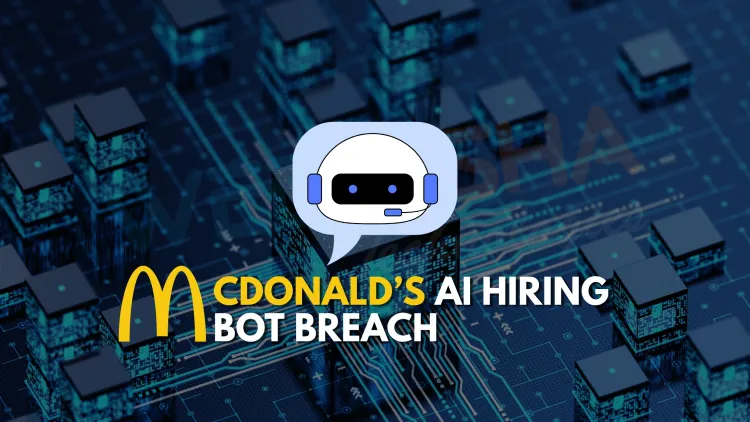What is the McDonald’s AI bot data breach involving 64 million applicants?
In July 2025, McDonald’s AI-powered hiring platform suffered a significant data breach exposing personal information from around 64 million job applicants worldwide. Researchers accessed the admin panel using the password “123456” with no MFA enabled. Exploiting an IDOR vulnerability, attackers could view names, emails, phone numbers, and AI chat logs. The breach highlights risks related to AI-based recruitment systems and emphasizes essential cybersecurity measures like strong passwords, MFA, vulnerability patching, and account management.

In July 2025, cybersecurity researchers uncovered a major data breach affecting McDonald’s AI-powered hiring platform, exposing the personal information of approximately 64 million job applicants globally. This breach highlights the growing risks associated with AI-driven recruitment systems and underscores how basic security oversights—like weak passwords and inactive account management—can lead to serious consequences.
What Happened in the McDonald’s AI Bot Data Breach?
The breach specifically targeted McDonald’s AI hiring bot, "Olivia," used on the McHire recruitment platform. According to reports, security researchers were able to access the admin panel using the default password “123456.” Critically, no multi-factor authentication (MFA) was enabled to protect the admin login.
Once inside, attackers exploited an Insecure Direct Object Reference (IDOR) vulnerability, allowing them to access other users’ data by simply modifying user IDs in the URL.
The breach exposed:
-
Full names of applicants
-
Email addresses
-
Phone numbers
-
Complete chat logs with the AI bot
The compromised admin account was an old, inactive test account left on the system since 2019—a classic case of poor security hygiene.
Why This Breach Is Especially Dangerous
The scale and nature of this leak present multiple cybersecurity risks:
-
Attackers could impersonate McDonald’s recruiters, launching phishing or fake job scams.
-
Sensitive applicant data collected over several years was exposed across different countries.
-
Victims now face risks of identity theft, financial fraud, and payroll redirection scams.
For organizations using AI and automated systems, this incident demonstrates how basic security failures—such as using weak passwords—can undermine even the most advanced technologies.
How the Breach Happened: A Breakdown
| Factor | Description |
|---|---|
| Weak Password | Admin panel secured with “123456” |
| No MFA | Multi-Factor Authentication was not enabled |
| IDOR Vulnerability | Allowed attackers to modify user IDs to access other applicant records |
| Inactive Accounts | Old test accounts remained active since 2019 |
Key Lessons from the McDonald’s AI Bot Security Incident
-
AI-powered platforms must follow the same rigorous security protocols as traditional IT systems.
-
Basic security practices like enforcing strong passwords, enabling MFA, and removing unused accounts are critical.
-
Regular vulnerability assessments should be conducted, especially for systems handling sensitive personal data.
-
Insecure Direct Object Reference (IDOR) flaws remain one of the most common and preventable web application vulnerabilities.
Recommended Security Practices for AI Recruitment Systems
-
Implement strong password policies and enforce password complexity.
-
Always enable multi-factor authentication for admin and user accounts.
-
Regularly audit user accounts to disable or delete inactive users.
-
Perform penetration testing and code reviews to identify IDOR and similar vulnerabilities.
-
Ensure GDPR, CCPA, and other privacy compliance requirements are met to avoid regulatory penalties.
Conclusion
The McDonald’s AI bot breach serves as a critical reminder that even global enterprises using cutting-edge AI technology are not immune to simple security mistakes. Organizations must prioritize cybersecurity hygiene alongside adopting AI tools to protect sensitive customer and employee data.
Staying proactive with security measures helps prevent costly breaches, reputational damage, and legal consequences in today's increasingly AI-driven business environment.
FAQs
What is the McDonald’s AI hiring bot "Olivia"?
"Olivia" is McDonald’s AI-powered chatbot used on the McHire recruitment platform to assist with job applications and interview scheduling.
How did the McDonald’s AI bot breach happen?
The breach happened due to weak admin credentials ("123456") and lack of multi-factor authentication, allowing attackers to access sensitive applicant data.
What kind of vulnerability was found in McDonald’s AI bot system?
An Insecure Direct Object Reference (IDOR) vulnerability was found, allowing attackers to manipulate user IDs to view other applicants’ data.
How many job applicants' data was exposed in the McDonald’s AI bot breach?
Around 64 million applicants' personal information was exposed.
What type of data was leaked in the McDonald’s AI bot breach?
Leaked data included names, emails, phone numbers, and full chat logs with the AI bot.
Was multi-factor authentication enabled on the McDonald’s AI bot admin panel?
No, multi-factor authentication was not enabled, which contributed to the breach.
How long did it take for the McDonald’s AI bot breach to be exploited?
Researchers reported that it took less than 30 minutes to access the admin panel and exploit the vulnerability.
What is IDOR in cybersecurity?
IDOR (Insecure Direct Object Reference) is a vulnerability where attackers can manipulate input parameters to access unauthorized data or functions.
Why is using “123456” as a password dangerous?
It’s a commonly used weak password easily guessed by attackers, exposing systems to brute force and credential-stuffing attacks.
When was the compromised admin account created?
The compromised admin account was reportedly an old test account left active since 2019.
What countries were affected by the McDonald’s AI bot data leak?
The breach affected job applicants globally across multiple countries where McHire is used.
Can attackers launch phishing campaigns using the leaked McDonald’s applicant data?
Yes, attackers can impersonate McDonald’s recruiters to conduct phishing or job scam campaigns using the exposed data.
What are the primary risks to victims of the McDonald’s AI bot breach?
Victims may face identity theft, financial fraud, and payroll scams.
How should companies secure AI-powered recruitment platforms?
Companies should use strong passwords, enforce MFA, regularly audit user accounts, and conduct security testing.
Why are inactive test accounts a security risk?
Inactive accounts can be forgotten and left with default credentials, becoming easy targets for attackers.
What lessons can be learned from the McDonald’s AI bot breach?
Organizations must maintain basic cybersecurity hygiene, including password policies, MFA, and removing unused accounts.
How can IDOR vulnerabilities be prevented?
By implementing proper access controls, input validation, and using unique session tokens instead of exposing user IDs in URLs.
Was the McDonald’s AI bot breach due to advanced hacking?
No, it was due to basic security oversights like weak passwords and inactive accounts.
What regulatory consequences can occur from such a data breach?
Violations of GDPR, CCPA, or other data privacy laws can lead to hefty fines and legal action.
How can individuals protect themselves if their data was leaked?
Monitor for phishing emails, change account passwords, and consider identity protection services.
Why are AI systems like Olivia vulnerable to such attacks?
AI systems rely on backend infrastructure that, if misconfigured or poorly secured, becomes an attack vector.
What is McHire?
McHire is McDonald’s job application platform that integrates the AI chatbot "Olivia" for streamlining recruitment processes.
What role does cybersecurity hygiene play in preventing data breaches?
Good cybersecurity hygiene prevents basic errors that often lead to large-scale breaches, such as using strong passwords and enabling MFA.
What is the importance of multi-factor authentication?
MFA adds an extra layer of security beyond passwords, making unauthorized access much harder.
How common are breaches involving AI systems?
With AI adoption increasing, breaches targeting AI systems are becoming more frequent, especially where basic security controls are lacking.
How can developers secure chatbot platforms like Olivia?
By enforcing strict access controls, secure coding practices, vulnerability scanning, and regular audits.
What happens if an AI bot gets compromised?
Attackers may gain access to sensitive data, manipulate interactions, or use the bot for social engineering.
How serious is a data breach involving AI recruitment platforms?
It’s highly serious as it involves sensitive PII (Personally Identifiable Information) collected from job applicants globally.
What is McDonald’s doing to address the breach?
While specific actions weren’t detailed, typical responses include patching vulnerabilities, disabling compromised accounts, and notifying affected individuals.
Can breaches like this affect brand reputation?
Yes, data breaches can significantly damage a company’s trust and brand reputation, affecting customer and applicant confidence.
Why is regular account auditing important in cybersecurity?
Auditing helps detect and remove inactive or unnecessary accounts, reducing the risk of unauthorized access.














![Top 10 Ethical Hackers in the World [2025]](https://www.webasha.com/blog/uploads/images/202408/image_100x75_66c2f983c207b.webp)








